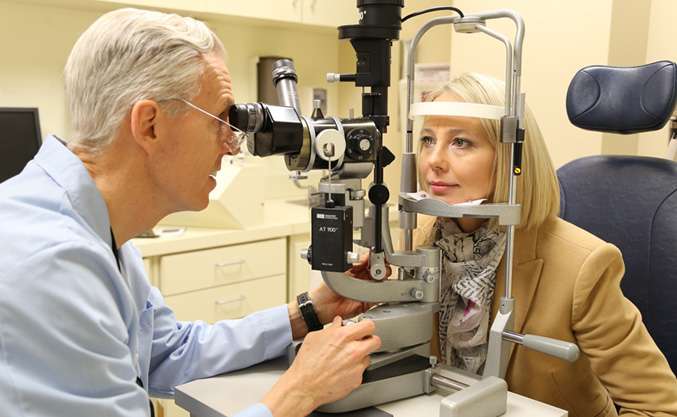'Lazy eye' childhood condition can be treated in adults

When Aleksandra Pryszczewska was a toddler, she often stumbled and bumped into things because of an eye condition called strabismus, or lazy eye. Her left eye veered to the far right, altering her line of vision causing her sight to be impaired.
While strabismus is traditionally corrected during early childhood, Ms. Pryszczewska's only surgery was unsuccessful.
"Although my family was not able to have my eye corrected as a child in Poland, I never gave up on the possibility as an adult in America," she said. "Every time I went to a doctor, I would ask if I could have my eye corrected. Each time I was told no, it was not possible. Finally, a doctor told me Loyola was the only medical center he knew that would treat adults with this eye condition."
Loyola provides integrated clinical care for eye conditions and disorders, bringing together specialists in ophthalmic, oculoplastic and orbital surgery, otolaryngology, neurology and head and neck surgery to provide adults and children with advanced care in a compassionate environment.
In strabismus, an eye appears to be crossing, drifting or misaligned. Almost two percent of children in America are born with strabismus. Loyola University Medical Center is one of only a handful of academic medical centers that correct strabismus in adults.
For more than two decades, James McDonnell, MD, has been performing eye surgeries in adults and children at Loyola. "I noticed right away that Aleksandra had a very, very large deviation in her eye," said Dr. McDonnell. "She had received an operation when she was five but it was not done properly. Her left eye looked almost straight sideways and also looked down."
As Ms. Pryszczewska grew up, her eye condition caused her to be shy and self-conscious. "Especially as a teenager, I was very aware that my eye drifted and I was not able to control my focus to look directly at anyone," she said. "No one wants to be different and I felt unattractive and had low self-esteem. When I was tired or ill, my eye would be especially off."
Ms. Pryszczewska, a 36-year-old Chicago scientist, recalls feeling a sense of long-lost hope during her initial visit with Dr. McDonnell. "He asked me why I wanted my eye corrected and I told him it wasn't about appearance or looks, it was about becoming confident," she said. "I could tell that Dr. McDonnell totally understood how I felt."
Dr. McDonnell corrected her vision in a two-hour outpatient surgical procedure in which the six extraocular (outer) eye muscles are tightened and/or loosened to achieve alignment.
"Some people are born with strabismus and some develop it, but everyone just wants their eyes to be normal," said Dr. McDonnell. "Research has shown that left untreated, people with strabismus earn lower incomes, attain lower levels of education and have a lower rate of marriage. And it doesn't have to be this way."
Adult strabismus can be corrected. "For people who have been unsuccessfully treated for strabismus and are told they can't have another surgery, that's wrong," said Dr. McDonnell. "If they've been told they've had this condition for their whole life and it can't be corrected, that's also wrong. And if told that it is too big of a deviation, as Aleksandra was told, that truly is wrong. I perform dozens of adult strabismus surgeries each year, with excellent outcomes."
Thanks to the eye surgery at Loyola, Ms. Pryszczewska now feels confident. "I am so happy and so very grateful. It always makes me cry when I think of it and what he did for me," she said. "I can only tell him, 'Thank you! Thank you!'"
As part of an academic medical center, Loyola's expert clinicians perform and teach the latest surgical techniques and medical treatments in numerous locations across the Chicago area. All of Loyola's ophthalmologists and ophthalmic, oculoplastic and orbital surgeons are fellowship-trained and provide training and education to doctors at other hospitals. In addition, Loyola nurses have earned Magnet status, which means they have been recognized for delivering the highest level of care.















